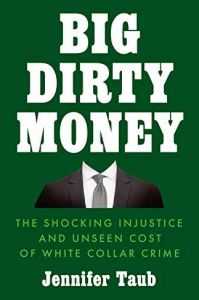Join getAbstract to access the summary!

Join getAbstract to access the summary!
Jennifer Taub
Big Dirty Money
The Shocking Injustice and Unseen Cost of White Collar Crime
Viking, 2020
What's inside?
For wealthy bad actors in the United States, impunity rules.
Recommendation
Just two decades ago, bad actors in corner offices could expect to go to prison. Remember the long sentences handed down to Jeff Skilling of Enron and Bernie Ebbers of WorldCom? Alas, tough consequences have all but disappeared for corporate criminals, reports law professor Jennifer Taub. After the global financial crash of 2008, US prosecutors took down just one participant in the mortgage meltdown. Contrast that with the 1,000-plus bankers convicted after the savings-and-loan crisis of the 1980s. Taub delves into the history and the present of white-collar convictions, and calls for a future characterized by more aggressive prosecutions of wealthy criminals.
Summary
About the Author
Jennifer Taub, a professor of law at the Western New England University School of Law, is a legal scholar and advocate who promotes transparency and opposes corruption.


















Comment on this summary